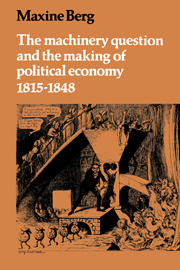Book contents
- Frontmatter
- Contents
- List of Illustrations
- Preface
- Introduction
- PART ONE THE MACHINERY QUESTION
- 1 The age of machinery
- 2 The progress of the machine
- 3 The advent of political economy
- PART TWO THE POLITICAL ECONOMY OF MACHINERY
- PART THREE A SCIENCE OF MACHINERY
- PART FOUR THE POLITICS OF MACHINERY
- PART FIVE THE SOCIAL CRITICS OF MACHINERY
- EPILOGUE: BEYOND MACHINERY
- Bibliography
- Index
3 - The advent of political economy
Published online by Cambridge University Press: 29 January 2010
- Frontmatter
- Contents
- List of Illustrations
- Preface
- Introduction
- PART ONE THE MACHINERY QUESTION
- 1 The age of machinery
- 2 The progress of the machine
- 3 The advent of political economy
- PART TWO THE POLITICAL ECONOMY OF MACHINERY
- PART THREE A SCIENCE OF MACHINERY
- PART FOUR THE POLITICS OF MACHINERY
- PART FIVE THE SOCIAL CRITICS OF MACHINERY
- EPILOGUE: BEYOND MACHINERY
- Bibliography
- Index
Summary
As industrialisation began several decades before 1800, so the Machinery Question had antecedents in eighteenth-century economic debate. I will now turn to these antecedents, and will then go on to examine the parallel emergence of the machinery question and the discipline of political economy in the early nineteenth century. This chapter will suggest that it was not just the economic context of rapid mechanisation, but also the intellectual context of the early years of political economy, which helped to bring the machinery question to the fore. Conversely, I shall argue that it was the problem presented to writers on economic affairs of explaining and justifying the rapid technological transformation which was formative in the development of political economy as a discipline in the early nineteenth century.
Even in the early stages of industrialisation in the eighteenth century, observers recognised the social implications of the machine. The early literary and philosophical societies in the late eighteenth century extolled the ‘improvement’ made manifest in the machine. They began to explore the connections between scientific discovery and the remarkable advances in technology they were beginning to witness. There was also a pamphlet literature on machinery riots. Fairly typical pamphlets were Thomas Barnes's Thoughts on the Use of Machines in the Cotton Manufacture Addressed to the Working People in that Manufacture by a Friend of the Poor, Manchester, 1780, and the anonymous Letters on the Utility of Employing Machines to Shorten Labour, 1780.
At a more theoretical level, Adam Smith and Lord Lauderdale discussed central issues in the development of technology and its relationship to the dynamic transformation of the economy.
- Type
- Chapter
- Information
- Publisher: Cambridge University PressPrint publication year: 1980

